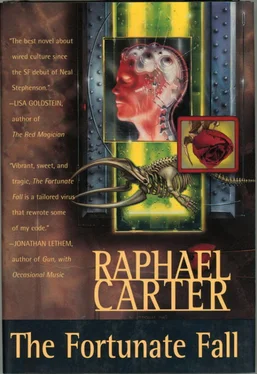Raphael Carter - The Fortunate Fall
Здесь есть возможность читать онлайн «Raphael Carter - The Fortunate Fall» весь текст электронной книги совершенно бесплатно (целиком полную версию без сокращений). В некоторых случаях можно слушать аудио, скачать через торрент в формате fb2 и присутствует краткое содержание. Город: New York, Год выпуска: 1996, ISBN: 1996, Издательство: Tor Books, Жанр: Киберпанк, на английском языке. Описание произведения, (предисловие) а так же отзывы посетителей доступны на портале библиотеки ЛибКат.
- Название:The Fortunate Fall
- Автор:
- Издательство:Tor Books
- Жанр:
- Год:1996
- Город:New York
- ISBN:0-312-86034-X
- Рейтинг книги:3 / 5. Голосов: 1
-
Избранное:Добавить в избранное
- Отзывы:
-
Ваша оценка:
- 60
- 1
- 2
- 3
- 4
- 5
The Fortunate Fall: краткое содержание, описание и аннотация
Предлагаем к чтению аннотацию, описание, краткое содержание или предисловие (зависит от того, что написал сам автор книги «The Fortunate Fall»). Если вы не нашли необходимую информацию о книге — напишите в комментариях, мы постараемся отыскать её.
“Gripping…. One of the most promising SF debuts in recent years”.
—“Publisher’s Weekly” starred review
The Fortunate Fall — читать онлайн бесплатно полную книгу (весь текст) целиком
Ниже представлен текст книги, разбитый по страницам. Система сохранения места последней прочитанной страницы, позволяет с удобством читать онлайн бесплатно книгу «The Fortunate Fall», без необходимости каждый раз заново искать на чём Вы остановились. Поставьте закладку, и сможете в любой момент перейти на страницу, на которой закончили чтение.
Интервал:
Закладка:
“Are you sure?” she asked, solicitously. “Do you need some time to think it over?”
“The last thing I want to do is think it over. Just do it.”
She looked at me with concern, but relented. “All right, then. You’ll need an adapter.”
“Why?”
“You’ll have to put it in your wrist. You can’t alter a chip in a skull socket; the hardware won’t do it. Security thing. Is your adapter still in your duffel?”
“No. I, um, I put it away…. Hang on.” I opened my junk drawer to look. When I didn’t see it, I started furiously rummaging through the drawer; I had to fight back the urge to dump its contents on the floor. Then Keishi came, stood behind me, and put her hand on my shoulder—the faintest of pressures, an insect alighting. I forced myself to calm down. She glanced at the drawer and reached through my shoulder to point out where the adapter lay.
I picked it up. “Which wrist?”
“Left, since you’re left-handed.”
I slid the plug into its socket, wrapped the Velcro cuff around my wrist, and started to put in my camera chip.
“Not that one, the 6000,” she said.
“What difference does it make?”
“Well, there’s—” she began, then broke off and smiled. “This probably isn’t the time for a technical lecture. Let’s just say the old chip isn’t up to it.”
I went into the bedroom to collect the rosebox from my closet. At first I hesitated over the choice of chipsets, but she said, “It doesn’t matter. Once I’ve done one, it’ll be easy to copy the changes to the other two.” I plugged the chameleon chip into the adapter, where it promptly sprouted trompe l’oeil black Velcro fur.
“Find a comfortable place to sit,” she said. “The first one may take a while.”
I sat on the armchair that Keishi had vacated—briefly surprised to find the cushion cold. I slipped off my shoes and leaned back.
“Just try to relax,” she said.
“I am relaxed.”
“The hell you are. If your heart were going any faster it’d break the sound barrier. Breathe slowly, and count your breaths—just up to four, then repeat it. Try to clear your mind of everything else.”
As I struggled for calm, she made the motions of taking something out of a bag, though there was no bag to be seen. Then she crawled up onto an invisible ledge five feet above the floor—a levitating mime—and reclined there, in a slightly cramped position. Her real body must have been getting into the sleeping compartment on the train. She unbound her hair, which suddenly became longer. That must be what she really looked like, I thought with half-suppressed excitement. Her hair was lifted back into the thing she had set up—a myrmichor; it must be. That was how the African engineers had solved the problem of getting data into a head without using sockets: they’d replaced her hair with some sort of conductive fiber. If I ran my fingers through it, would it be soft, or stiff, I wondered? I longed to try—a small, quiet longing; but I had not felt one as strong in twenty years.
Then I remembered how, when I had first realized she knew about my suppressor chip, I had pictured her configuring it with a waldo at a table, not with her hair in a myrmichor. That image had been so vivid—where had it come from? Who had sat at a table for hours that way, with cables trailing from her head and arms?
But there was no time to think of that. I could already feel my hand beginning to stir, to touch wires and move among patterns, though physically, of course, it hadn’t moved at all. If the image with the waldo was a memory, I would know in the morning. The dream coprocessor would bring it up.
“Do you want me to take your hand offline?” she asked, in a strangely blurred voice.
“No,” I said. “No, leave it on. I want to feel it.”
“I always knew you were the Lamaze type.” She chuckled distractedly. “I’m going to give you a phrase to say when you want the desuppression to begin. It’s not in Russian, so you won’t say it by accident. Listen closely: O vos omnes, qui transitis per viam. Say that back to me.”
I repeated the phrase.
“Good. Now don’t say it again, unless you mean it.”
“I won’t,” I said.
“If you feel like sleeping, do.”
“I’m not tired,” I said. “I’m not tired at all.” But hours later, when she wanted me to switch chips, she had to rouse me first; and by the time she had finished all three, I was sound asleep.
She touched my cheek to wake me. “Go to bed. I’m going to stay with you tonight.”
I looked at her, blinking thickly, and said, “Are you here?”
“No. You’re still asleep. I mean in virtual. If I were there, I’d have carried you to bed, so I didn’t have to wake you. One of the problems with being discorporate.”
“What time is it?”
“About three in the morning.”
“Oh, God,” I said, finally coming awake, “I’ve got the interview of my life tomorrow and I’m completely unprepared—”
“Don’t worry. I’ll give you a moistdisk in the morning. You’ll be fine. Everything will be fine.”
I went to bed without undressing, setting the adapter on my nightstand. She stood by the door, where, it seemed, she meant to keep vigil all night. And just as I fell asleep—or did I dream it?— she came and kissed me on the eyes. Her lips seeped a little way through the lids into the liquid depths behind them: small, cold kisses: silver coins.
(The Frog)
(Dreams aren’t stories. They don’t have a point, a theme, a plot, a moral. All those things take skill to craft, and the sleeping mind is inept. That’s why most dreams are just a lot of aimless wandering. Once in a while you’ll be awake enough for a small part of you to feel you should be getting somewhere, and then the dream becomes a nightmare.
All night I dreamed that I was walking through the streets, carrying a sack of groceries that I could not manage to look into. Then I dreamed I woke up from that dream, to find myself back in the reclining chair in the living room. Keishi was floating above the floor. My left hand had detached itself and was holding a scalpel; it had slit my arm open, from finger to elbow. The skin was fastened back to the arm of the chair with dissecting pins, and among the flayed muscles, I could see my arteries begin to pulse. Keishi drifted toward me, bent down as if to whisper some secret in my ear, and then opened her mouth and exhaled daisies.)
2
PHYSICAL BONES
“However,” added objective Pnin, “Russian metaphysical police can break physical bones also very well.”
—Vladimir Nabokov, PninThirteen
ICARUS
Rain: I woke to the sound of rain crashing above me. The falling drops were blowing against the wire mesh of the window-screen, filling it in square by square, like pixels on a monitor. Perhaps all the windows in the city, if seen from a sufficient distance, would form some enormous image that only the gods could see. I lay there trying to guess the pattern a long time. Then I stretched in my pocket of warmth beneath the blankets, and turned over. The camera chip was there, still plugged into its adapter. It had been no dream.
I went into the bathroom, opened the little window above the shower, and cleaned out all the crumpled newspaper—blank newspaper; they sell it in Leningrad stores expressly for the purpose of being wadded up in windows. I jammed it all into the wastebasket and opened up the outer window, so the clean, cool air from outside could dispel the bathroom’s mustiness. Then I took a shower, hot and luxuriously long. I should be careful about the water, I knew; but I would be careful tomorrow, tomorrow would be soon enough. Today, even the city was being cleansed by this downpour. I closed my eyes and imagined it, as I worked lather into my hair. The sky threw down great solid sheets of water that fell against the rooftops, where they shattered into drops. The rain poured down along the shingles, picking up and carrying with it every crumb of dirt that Leningrad possessed; and streaming down from eaves and windowsills, it crashed into the streets and ran down gutters in excited single-files, which met at drains and, crowding round them, plunged together into nothingness. Even the veins of stink that lay beneath the city must, I thought, have been washed clean by this exuberance of rain. “Freedom,” Keishi had said; and though I knew that it could never be so simple, I allowed myself to hope.
Читать дальшеИнтервал:
Закладка:
Похожие книги на «The Fortunate Fall»
Представляем Вашему вниманию похожие книги на «The Fortunate Fall» списком для выбора. Мы отобрали схожую по названию и смыслу литературу в надежде предоставить читателям больше вариантов отыскать новые, интересные, ещё непрочитанные произведения.
Обсуждение, отзывы о книге «The Fortunate Fall» и просто собственные мнения читателей. Оставьте ваши комментарии, напишите, что Вы думаете о произведении, его смысле или главных героях. Укажите что конкретно понравилось, а что нет, и почему Вы так считаете.












